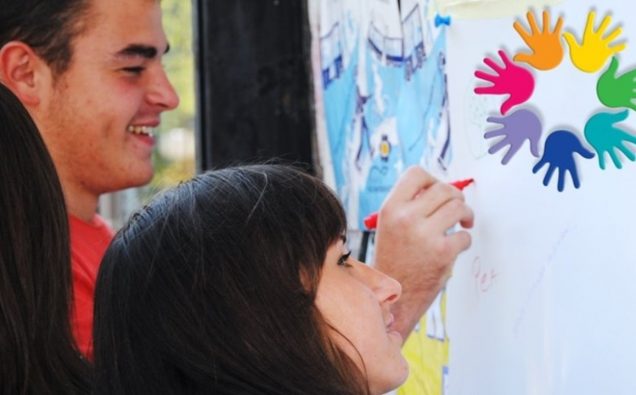
The world is brimming with youthful energy. The planet has never seen such large numbers of young people – 1.2 billion in cities, towns and villages around the globe.
But the world has also never seen such a huge number of youth – about 600 million – trapped in poverty and conflicts.
So, how will the young people – aged between 15 to 24 – shape the world under this scenario?
With their boundless energy, where will young lead the world to on defining issues like climate change, hunger, gender equality, economic opportunity and education? In short, will peace and harmony finally prevail over conflicts, terror and civil wars?
The world before the young men and women presents a stage of contradictions, challenges and hopes existing side by side.
For instance, young people all over the world are the most connected generation in the history, as noted by Jayathma Wickramanayake, the UN Special Envoy on Youth.
This interconnectedness has opened up Prometheus Unbound possibilities where scientists, doctors, scholars and journalists can share the light of new knowledge with their peers in the developing world.
Yet, for all its benefits, the Internet could not help realize the Arab Spring dreams of democracy, and on the contrary states and militant groups used the information superhighway to sway the minds and opinions of their targets. The international community seems a long way off the goal of coming together as a comity of nations.
Many countries in Africa, Middle East and South Asia do not provide enabling environment for their youth to make use of their talent.There are 71 million unemployed young people – which means they are vulnerable to all kinds of dangers from militancy to crime as individuals and groups will exploit their conditions to misguide them.
Around the globe, millions are out of school due to poverty – which means they do not have access to education or skills development opportunities, and therefore cannot be part of change for the better in significant ways.
Then there are refugees, who face uncertain future in many conflict-hit countries of the Middle East and Africa.
Next week, more than 500 young people will gather at the United Nations to exchange ideas on how the world can benefit from the young talent.
“It is really the best of the times to be a young person but also the worst of the times,” says Wickramanayake, using Charles Dickens’ memorable description from A Tale of Two Cities.
Speaking in New York ahead of the UN Economic and Social Council Youth being held from January 30 to 31.
The UN platform will present an opportunity for the young leaders and the government and civil society representatives to discuss “critical issues affecting young people, ranging from poverty, unemployment, inequalities to climate change, clean energy and safe cities.”
So, where do we stand in terms of realizing our youth’s potential for progress and change?
A series of sobering reports including Freedom House Index of democratic freedom, Oxfam’s study on widening inequality in the world and the rise of the far right – opposed to globalization and fueling exclusivism – and the never-ending conflicts in the absence of a strong world leadership or a powerful world forum provide a heartbreaking reality check.
But a simultaneous emergence of powerful strong voices that have dared to challenge the tide of militancy, avarice and corruption has raised hopes for many communities. Pakistan’s Malala Yousafzai’s success in galvanizing world support for her cause of girls’ education is a silver lining. As indeed are many other stories at national and community levels, where the youth participate and lead the way toward common good.The worldwide celebration of her evolving success story of education mission since her survival of militant attack speaks of the good that the media and well-meaning leaders can help bring about.
Internationally, the relative success of Tunisian Arab Spring quest for democracy, gives rise to optimism, although the scales of death and destruction in Syria, Iraq, Libya and Yemen eclipse such gains in just one country in the broader Middle Eastern and North Africa regions.
Young people around the world including those fighting repressive regimes have also shifted gear to more dynamic activism for their causes, making it clear that their opinions will matter.
The challenge for change is not for the youth alone. It is for the current political leaders, especially in the powerful capitals. As witnessed in the terrible outcomes of Egyptian and Syrian Arab Spring revolutions, actions and policies of world leaders will impact how the young people get their voices heard. So, will the world leaders rise above immediate political calculations and provide an enabling environment for the youth to progress and prosper in a climate of peaceful coexistence?





![By Jonathan Rashad (Flickr) [CC BY 2.0 (http://creativecommons.org/licenses/by/2.0)], via Wikimedia Commons](https://www.viewsnews.net/wp-content/uploads/2015/10/Tahrir_Square_on_February11.jpg)
![Claude Truong-Ngoc / Wikimedia Commons - cc-by-sa-3.0 [CC BY-SA 3.0 (http://creativecommons.org/licenses/by-sa/3.0) or CC BY-SA 3.0 (http://creativecommons.org/licenses/by-sa/3.0)], via Wikimedia Commons](https://www.viewsnews.net/wp-content/uploads/2017/04/Photo_de_famille_lors_de_la_remise_du_25e_prix_Sakharov_à_Malala_Yousafzai_Strasbourg_20_novembre_2013_03-1024x683.jpg)












